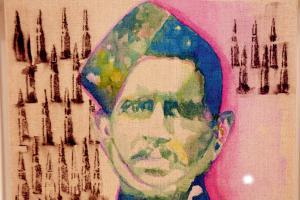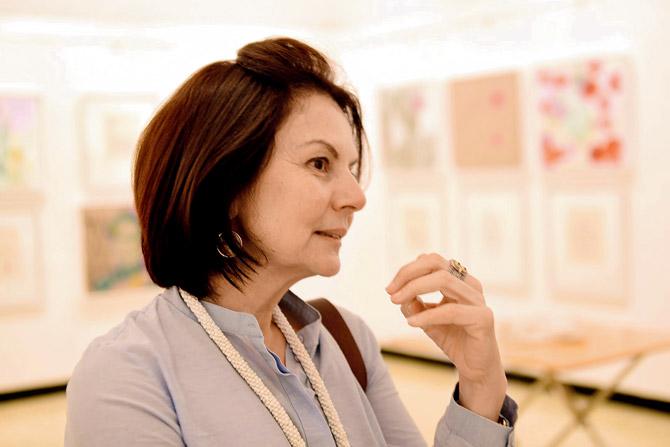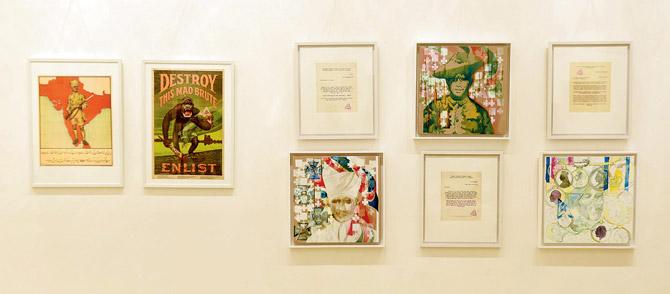Angeli Sowani takes us through her new exhibition stitched together with letters, photographs and songs of the Indian soldiers of World War I, and her own paintings inspired by them, which tell you why war is never the answer

Sepoy series: Darwan Sing Negi. Pics/Bipin Kokate
For God's sake don't come, don't come, don't come to this war in Europe... Cannons, machine guns, rifles and bombs going off day and night, just like the rains in the month of Sawan. Those who have escaped so far are like the few grains left uncooked in a pot," wrote Havildar Abdul Rahman (59th Rifles) to Naik Rajwali Khan (Baluchistan) on May 20, 1915, from France. The letter, originally in Urdu, was translated and censored for record-keeping and withheld from being posted. The war story, after all, had to tell, in the words of Wilfred Owen, "The old Lie: Dulce et decorum est, Pro patria mori" or, how sweet and honourable it is to die for one's country, in Latin.
ADVERTISEMENT

Angeli Sowani
Fittingly enough, the letter finds itself right below another one — from the Buckingham Palace, signed by King George V, which conveys to the soldiers that the "Mother Country is proud of your splendid services characterised by unsurpassed devotion and courage." The exhibition Medals & Bullets, by British-Indian artist Angeli Sowani, is one interspersed with these stark contrasts. "Every medal comes at the cost of countless bullets," Sowani tells us, as she oversees letters, pictures, enlistment posters and songs of the Indian soldiers of World War I go up on the ivory walls of Jehangir Art Gallery, on the inaugural day.

The exhibition includes posters designed to enlist soldiers, translated letters, folk songs and paintings
The solo show is the culmination of the year-long research the London-based artist undertook on the forgotten Indian heroes of the war. The year 2018 marked the centenary of the Armistice Day, and several events commemorated the occasion across the UK. It was at one such documentary screening where Sowani heard a sound bite on the contribution of soldiers from colonial India — of the 10 lakh combatants and non-combatants drawn from the country, 70,000 were killed while 9,200 won gallantry awards.
Keen on finding out more, she began her journey at the war cemeteries in Flanders, Belgium, last year. "On one of the graves there are the words 'Om bhagwate namah'. It was heartrending to see that here lay a soldier — paid an average of '11 a month, most sepoys had never ventured beyond their villages — so far away from his motherland," she shares.

Laddie, a tribute to Indra Lal Roy, the sole Indian flying ace in the war
The visit to Flanders was followed up with several trips to the Imperial War Museum and British Library in London, where she accessed letters written, postcards exchanged and images circulated by Indian soldiers. In the process, she was also introduced to noted author and academic Santanu Das, whose book, 1914-1919, Indian Troops in Europe, helped her contextualise the letters. Before the National Institute of Design alumna picked up the brush, she also signed up for a course in World War I literature.
A recurring motif in her artworks is the gallantry medal itself. In one of the works, inspired by a soldier's depiction of the war as the warfare in Hindu mythology, she transforms the medals into butterflies, lifting into the sky — symbolic of lives flitting away.
A century and an enormous loss of lives later, two major countries of the Indian subcontinent were recently at the brink of war. Has man learnt his lessons at all? "This war was supposed to end all wars. Yet, we had the Second World War, and many more wars that followed," laments Sowani. "It seems like we can't stop fighting. The war never ends."
TILL March 24, 11 am to 7 pm
At Jehangir Art Gallery. Kala Ghoda
CALL 22843989
Catch up on all the latest Crime, National, International and Hatke news here. Also download the new mid-day Android and iOS apps to get latest updates
 Subscribe today by clicking the link and stay updated with the latest news!" Click here!
Subscribe today by clicking the link and stay updated with the latest news!" Click here!







